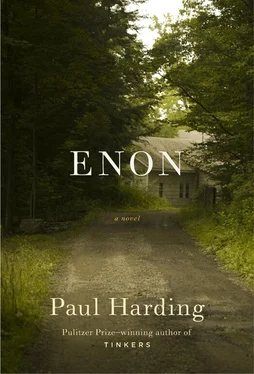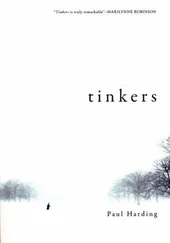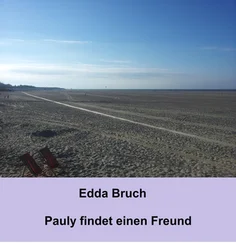Paul Harding - Enon
Здесь есть возможность читать онлайн «Paul Harding - Enon» весь текст электронной книги совершенно бесплатно (целиком полную версию без сокращений). В некоторых случаях можно слушать аудио, скачать через торрент в формате fb2 и присутствует краткое содержание. Жанр: Современная проза, на английском языке. Описание произведения, (предисловие) а так же отзывы посетителей доступны на портале библиотеки ЛибКат.
- Название:Enon
- Автор:
- Жанр:
- Год:неизвестен
- ISBN:нет данных
- Рейтинг книги:3 / 5. Голосов: 1
-
Избранное:Добавить в избранное
- Отзывы:
-
Ваша оценка:
- 60
- 1
- 2
- 3
- 4
- 5
Enon: краткое содержание, описание и аннотация
Предлагаем к чтению аннотацию, описание, краткое содержание или предисловие (зависит от того, что написал сам автор книги «Enon»). Если вы не нашли необходимую информацию о книге — напишите в комментариях, мы постараемся отыскать её.
Powerful, brilliantly written, and deeply moving Paul Harding has, in Enon, written a worthy successor to Tinkers, a debut which John Freeman on NPR called "a masterpiece." Drawn always to the rich landscape of his character's inner lives, here, through the first person narrative of Charlie Crosby (grandson to George Crosby of Tinkers), Harding creates a devastating portrait of a father trying desperately to come to terms with family loss.
Enon — читать онлайн бесплатно полную книгу (весь текст) целиком
Ниже представлен текст книги, разбитый по страницам. Система сохранения места последней прочитанной страницы, позволяет с удобством читать онлайн бесплатно книгу «Enon», без необходимости каждый раз заново искать на чём Вы остановились. Поставьте закладку, и сможете в любой момент перейти на страницу, на которой закончили чтение.
Интервал:
Закладка:
I played drums in the high school band and dreaded the Memorial Day parade because I had to spend the day among everyone I knew dressed in a shiny blue polyester suit, with a white sash, white bucks, and a blue plume sticking up from the crown of my white vinyl shako. After high school, I never thought about the parade until I moved back to Enon and had Kate.
Kate was born in November, on the Monday before Thanksgiving, but the next May, when she was six months old, I found myself taking her to the parade and following alongside the band with her in her carriage. I took her to the parade every year until she was old enough to join the Brownies, after which she marched in the parade, and I followed alongside her troop, taking pictures. She didn’t continue into Girl Scouts because by then she was preoccupied with tennis and running, but I was still able to lure her to the parade the two years before she died, although the last year, the spring before her death, she ran off with three of her friends and they all sat on a stone wall along the route, sucking on lollipops, knocking side to side off each other’s shoulders, laughing and yelling at their friends in the parade. I took their picture and they all mugged it up, making funny faces, and we kept the photo on the refrigerator until Kate died and Sue moved back to Minnesota and took it with her.
THE FIRST NIGHT I spent alone in the house after Sue left I lay on the couch in the living room, in the dark, resting my broken hand on my chest. The hand was swollen and my black-and-purple fingers stuck out of the cast. The doctor had given me a prescription of thirty what she called instant-release painkillers and I’d been following the directions on the prescription bottle to take one pill every four to six hours. I took a pill and my brain felt slightly rubbery. But my hand hurt so much that I began to resent the pain for distracting me from Kate. I found myself having a debate between thinking about Kate and concentrating on the pain. The argument became one of those tedious, seemingly never-ending dreams that irked and provoked me but from which I could not rouse myself, even though I was not, properly speaking, sleeping.
I had known lots of guys over the years who took pills and mixed them with other drugs and alcohol. I thought, A second pill won’t kill me; it’ll just sand the burrs off the pain and cool down these voices, these antagonists who haven’t the decency to leave me in peace. I need a break, some rest. I’m just so cooked, so cracked up and crooked. If I get some time out, if I can just step back a little, get my feet back under me, let this hand heal a little, stop killing me so much, I can figure out how to get hold of myself.
I sat up and took another pill from the bottle and swallowed it dry. I was thirsty. My mouth stuck together and the pill seemed to adhere to the back of my throat. Instead of getting up for some water, I lay back down and rested my hand on my chest and closed my eyes and whispered, “Just have some mercy, please just have some mercy.”
I surfaced into consciousness four hours later, sweating and parched. I rose and lurched to the bathroom and ran the cold water tap in the sink until the tepid water in the pipes cleared and the chilled water from underground poured out. I filled the red plastic cup Kate had used for rinsing her mouth when she brushed her teeth and gulped the water down and filled the cup again. I stood for a moment in the dark. What if Kate and Susan could just be upstairs, sleeping? I thought. Couldn’t I just be down here going to the bathroom and getting a drink of water, or having a couple Toll House cookies and drinking milk from the jug in the light from the refrigerator, the door propped open against my hip, and pulling back the shade on the kitchen door a couple inches to look out at the moonlit yard, to think for a second about all the animals out there, hidden, going about their business, to think that that was eerie but also taking some comfort in it and going back upstairs and peeking in on Kate to make sure she wasn’t hanging half off the bed like she often ended up and climbing back into bed next to Susan, and maybe even worrying about money or work for an hour before I fall back asleep? What a comfort that would be, worrying about money while my daughter slept.
Going back to sleep upstairs in Sue’s and my bed, next to Kate’s empty room, appalled me, so I went back to the living room and picked up the bottle of pills and shook it. I tapped a dozen pills into the palm of my hand. I pinched up two painkillers and put them in my mouth and washed them down with the rest of the cold water in the red cup.
I WOKE AT TWO the next afternoon and struggled to make a pot of coffee with my good hand. My broken hand hurt dangling at my side, so I held it up near my cheek. Out of habit I looked for birds in the backyard. We’d bought a couple of feeders and Kate kept them filled. She tried to get the chickadees to eat from her hand, but they never would. The feeders were empty by the time Kate was buried. I couldn’t bring myself to refill them, so I fetched the bag of seeds we kept in the bottom drawer of an old bureau in the garage. After cranking open one of the windows in the nook, I removed the screen and scooped up a bunch of seeds in an old plastic juice pitcher that had faint traces of a family of cartoon bears painted on it, and tossed them out into the yard.
The empty house held its silence like a solid volume. There was weight to it. The hosts on talk radio sounded brash and insipid and oblivious. The music on the classical station sounded like music for a dentist’s office. Rock music sounded lurid and insincere. I tried to read a newspaper but the bad news made me feel more hopeless and the good news seemed invented. I wanted to call Sue’s parents’ house and ask if she’d arrived okay and ask if it felt better to be there, but I knew that that would be the wrong thing to do. Sue had called at some point the night before. I remembered hearing the message on the answering machine, and from the tone of her voice that she’d arrived without any problems. I already felt bad, not having answered her call, not having already called back, as if I’d missed my one slim chance. I couldn’t bring myself to listen to the message and I unplugged the phone. I checked my cell phone and saw that she’d left a message on it as well. I slid the backing off the phone and removed the memory card.
By three o’clock, it was unbearable to be in the house anymore, so I went outside and started to walk. I didn’t want to walk along the road, on the sidewalk. Someone might see me and stop and offer condolences or deliberate small talk. I imagined myself walking down the sidewalk and a woman pulling over and asking if I was doing okay and other people driving by and seeing me and knowing I was that grieving father and separated husband, and the exposure and embarrassment and humiliation being too much to take. But, since the Fairfield estate had been subdivided into a development twenty years earlier, it was no longer possible to cut through the fields that had originally been called Wild Man’s Meadow, when Enon had first been colonized, at least during the day. As conspicuous as walking along the road felt, cutting through the meadow would have drawn more attention, if only for the strange and sorrowful fact that in the thirty years there had been houses set around it, I had never seen anyone, adults or kids, in the meadow, no one exploring or stalking through the high summer grass or marching through winter snows. Whenever I passed it, I recalled swiping my way through the tall, buggy grass and being half terrified that the wild man, after whom the area had originally been named and about whom I had been told by some older neighborhood kids, was scrambling toward me with unnatural speed and aim from somewhere along the line of trees bordering the meadow. My terror was greatest in broad daylight, because of a sense that the wild man was so terrible and so wild he did not even need the cover of darkness or creeping stealth to claim his victims in his realm. I told Kate about the wild man one day when we were walking by the meadow. She must have been seven or eight — old enough to be told the story and be thrilled instead of frightened. But she had not been thrilled or frightened in the least.
Читать дальшеИнтервал:
Закладка:
Похожие книги на «Enon»
Представляем Вашему вниманию похожие книги на «Enon» списком для выбора. Мы отобрали схожую по названию и смыслу литературу в надежде предоставить читателям больше вариантов отыскать новые, интересные, ещё непрочитанные произведения.
Обсуждение, отзывы о книге «Enon» и просто собственные мнения читателей. Оставьте ваши комментарии, напишите, что Вы думаете о произведении, его смысле или главных героях. Укажите что конкретно понравилось, а что нет, и почему Вы так считаете.












